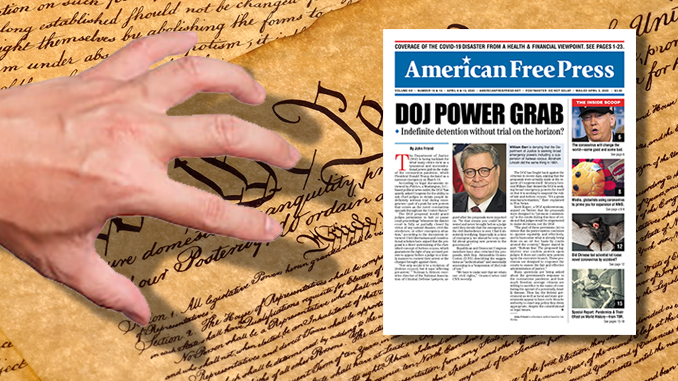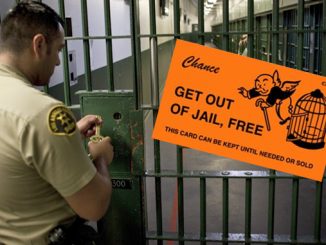
With AG William Barr in place during Covid-19, is indefinite detention without trial of Americans on the horizon?
By John Friend
The Department of Justice (DOJ) is facing backlash for what many critics view as a tyrannical and unconstitutional power grab in the wake of the coronavirus pandemic, which President Donald Trump declared as a national emergency on March 13.
According to legal documents reviewed by Politico, a Washington, D.C.-based political news outlet, the DOJ “has quietly asked Congress for the ability to ask chief judges to detain people indefinitely without trial during emergencies—part of a push for new powers that comes as the novel coronavirus spreads throughout the United States.”
The DOJ proposal would grant judges permission to halt or pause court proceedings “whenever the district court is fully or partially closed by virtue of any natural disaster, civil disobedience, or other emergency situation,” according to the documents reviewed. Civil libertarians and constitutional scholars have argued that the proposal is a direct undermining of the cherished concept of habeas corpus, which guarantees the right of any accused person to appear before a judge in a timely manner to contest their arrest or the charges brought against them.
“Not only would it be a violation of [habeas corpus], but it says ‘affecting pre-arrest,’ ” Norman L. Reimer, executive director of the National Association of Criminal Defense Lawyers, argued after the proposals were reported on. “So that means you could be arrested and never brought before a judge until they decide that the emergency or the civil disobedience is over. I find it absolutely terrifying. Especially in a time of emergency, we should be very careful about granting new powers to the government.”
Republican and Democrat Congress members have also criticized the proposals, with Rep. Alexandria Ocasio- Cortez (D-N.Y.) describing the suggestions as “authoritarian” and essentially amounting to a “suspension of [the] rule of law.”
“We have to make sure that we retain our civil rights,” Ocasio-Cortez told CNN recently.
The DOJ has fought back against the criticism in recent days, arguing that the proposals were actually made at the request of Congress itself. Attorney General William Barr denied the DOJ is seeking broad emergency powers for itself or that it is seeking to suspend the rule of law and habeas corpus. “It’s a gross mischaracterization,” Barr explained to Fox News. Kerri Kupec, a DOJ spokeswoman, argued on Twitter that the proposals were designed to “promote consistency” in the courts during this time of crisis and that judges would be empowered to make decisions, not the DOJ.
“The goal of these provisions (is) to ensure that the justice system continues to operate equitably and effectively, and to harmonize what is already being done on an ad hoc basis by courts around the country,” Kupec stated in part. “Bottom line: The proposed legislative text confers powers upon judges. It does not confer new powers upon the executive branch. These provisions are designed to empower the courts to ensure the fair and effective administration of justice.”
Many questions are being asked about the government’s response to the coronavirus pandemic and how much freedom average citizens are willing to sacrifice in the name of combating the spread of a potentially deadly disease. Thus far, the federal government as well as local and state governments appear to have carte blanche authority to enact any policy they deem appropriate, despite the constitutional or legal issues.
John Friend is a freelance author based in California.







What’s up with Barr and the whole Epstein situation? Will he sweep it under the rug as he often did under “W”? Either way the Swamp will never change.